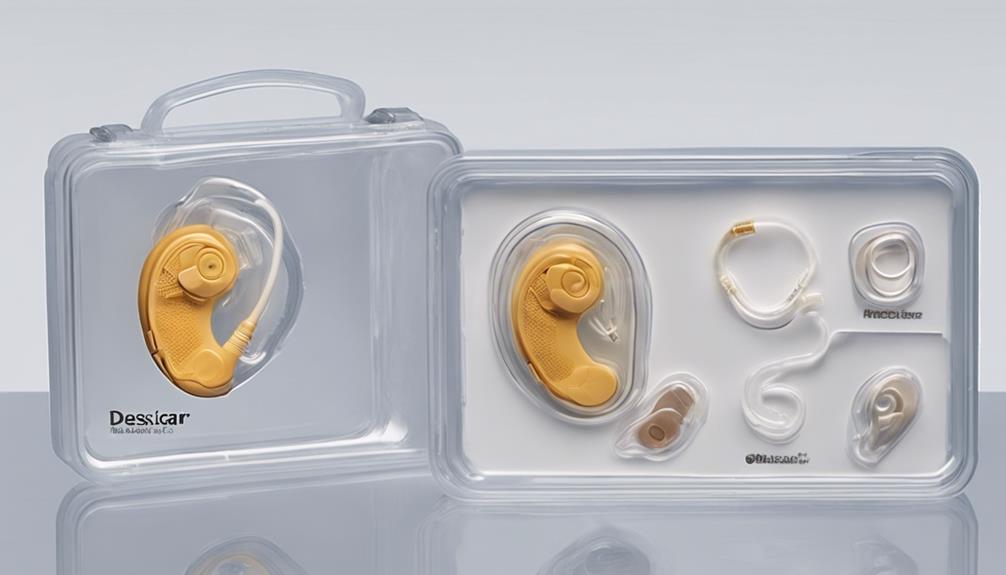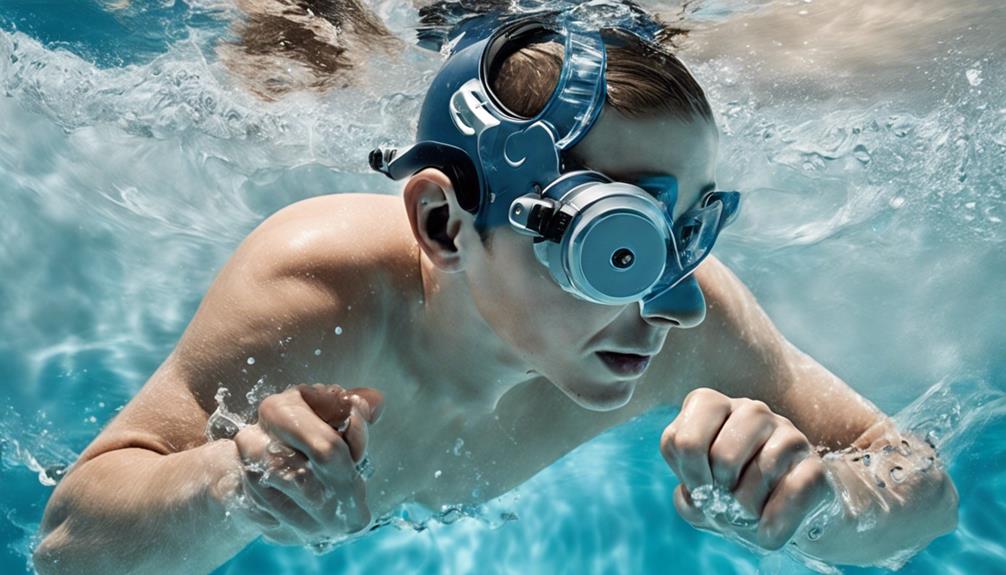So, you have gotten a cochlear implant and the last thing you want is for it to get wet accidentally, right? Let’s talk about ways to keep your implants dry and performing at their best.
From smart accessories to clever storage solutions, there are some simple yet effective ways to protect your cochlear implant from the perils of water.
Stay tuned for some valuable tips that could make all the difference in ensuring the longevity of your device.
Key Takeaways
- Use water-resistant accessories to protect cochlear implants.
- Employ dehumidifiers to eliminate moisture and maintain functionality.
- Store implants in dry containers and utilize protective sleeves.
- Avoid direct water exposure, follow manufacturer guidelines, and educate others on water sensitivity.
Importance of Keeping Cochlear Implants Dry
Ensuring the dryness of Cochlear implants is paramount for maintaining their functionality and longevity. These remarkable devices are highly sensitive to moisture exposure, which can lead to damage and affect their performance. To safeguard Cochlear implants against water-related issues, utilizing water-resistant accessories like Aqua+ sleeves is essential. Additionally, incorporating a dehumidifier or drying unit into your routine can effectively eliminate moisture and help prolong the lifespan of the implants.
Educating others about the susceptibility of Cochlear implants to water is crucial in preventing accidental damage. By raising awareness about the importance of keeping these devices dry, you can help ensure their optimal functionality. Engaging in regular maintenance practices, such as overnight drying in a designated storage container, is also vital for preserving the integrity of Cochlear implants. By following these practices diligently, you can significantly prolong the lifespan of the implants and maintain their effectiveness in facilitating hearing.
Waterproof Accessories for Cochlear Implants

Invest in the Aqua+ accessory, a reliable waterproof protection solution compatible with Nucleus 5, Nucleus 6, and Nucleus Kanso processors, to safeguard your Cochlear implant during water-related activities. The Aqua+ sleeve offers durable, reusable, and compact protection in various water types, including salt water and chlorinated pools. It ensures your Cochlear processor remains dry and functions optimally, making it suitable for underwater swimming and other water activities. By using the Aqua+ sleeve, you can protect your Cochlear implant from water damage, ultimately enhancing its longevity and performance.
| Features | Compatibility with Nucleus Processors | Water Type Compatibility | Functionality during Activities |
|---|---|---|---|
| Durable | Nucleus 5, Nucleus 6, Nucleus Kanso | Salt Water | Underwater Swimming |
| Reusable | Chlorinated Pools | Water Sports | |
| Compact |
Tips for Showering or Swimming With Cochlear Implants
When showering or swimming with Cochlear implants, it's crucial to take proactive measures to protect the devices from water exposure. Here are some essential tips to ensure the safety and performance of your Cochlear implants during water-related activities:
- Invest in waterproof accessories like the Aqua+ sleeve designed specifically for Cochlear implants to provide an extra layer of protection against water exposure.
- Always make sure that your Cochlear implant processor is securely covered and sealed before entering water to prevent any potential damage.
- Utilize a watertight activity case to safeguard your Cochlear processor while engaging in water activities such as swimming or showering.
- Educate those around you about the sensitivity of your Cochlear implant to water to prevent accidental exposure and potential damage.
Additionally, consider using a drying unit or dehumidifier post-water activities to remove moisture and help maintain the optimal performance of your Cochlear implant.
Proper Storage Techniques for Cochlear Implants

Properly storing Cochlear implants in a dry container or case when not in use is essential to prevent moisture buildup and maintain their functionality. Moisture can lead to malfunctions and potential damage to the device. Using a dehumidifier or drying unit overnight can help remove any accumulated moisture from the implants, ensuring they remain dry and operational.
It's important to avoid exposing Cochlear implants to extreme heat, direct sunlight, or water, as these elements can compromise their functionality. Protective sleeves or accessories designed for Cochlear implants can be utilized to prevent perspiration or water damage.
Regularly checking and cleaning the tubing of Cochlear implants is also crucial to identify and address any signs of condensation or moisture that may have accumulated. By following these storage techniques, you can help prolong the life of your Cochlear implants and prevent potential issues related to moisture buildup.
Common Mistakes to Avoid With Cochlear Implants
To ensure the optimal functionality and longevity of cochlear implants, it's crucial to be mindful of common mistakes that can potentially compromise their performance. Here are some common errors to avoid:
- Submerging the Processor: Avoid submerging the cochlear implant processor in water, as it can cause damage to the device.
- Excessive Sweating: Be cautious of excessive sweating around the cochlear implant to prevent moisture buildup, which can affect its performance.
- Water Activities: Keep the cochlear implant away from direct contact with water, such as during water activities or showers, to prevent water damage.
- Extreme Humidity: Don't expose the cochlear implant to extreme humidity or moisture, as this can impact its functionality. Follow manufacturer guidelines for waterproof accessories to protect the cochlear implant from getting wet and ensure its longevity.
Frequently Asked Questions
What Happens if My Cochlear Implant Gets Wet?
If our Cochlear implant gets wet, it can suffer internal damage, potentially leading to malfunctions. Water exposure may cause short circuits and impact sound quality.
It's crucial to turn off the device immediately and place it in a drying kit to absorb moisture. Prolonged water exposure could result in irreversible harm to the electronic components.
Following correct drying and maintenance procedures is essential for preventing water-related issues with Cochlear implants.
How Do You Dry a Cochlear Implant?
To dry a cochlear implant, we recommend using a drying unit specifically designed for Cochlear Implants. These units help remove moisture, extending the lifespan of the sound processor.
For enhanced drying, electronic dehumidifiers like Breeze By Dry & Store are excellent choices, providing warm, dry air circulation and efficient moisture absorption. Remember to turn off the processor before placing it in the dehumidifier to avoid damage.
Regularly monitor and reactivate indicator pellets in non-electronic dehumidifiers for optimal moisture removal.
Can Cochlear Implants Be Waterproof?
Yes, Cochlear implants can be made waterproof with accessories like Aqua+ sleeves. These sleeves protect the implants in various water types, including salt water and chlorinated pools. It's important to invest in a watertight activity case to prevent damage.
Informing others about the implants' sensitivity to water is crucial. Using a drying unit regularly is essential for maintenance and to prevent moisture-related damage.
How Do People With Cochlear Implants Wash Their Hair?
When washing our hair with cochlear implants, we take precautions to keep them dry. We use waterproof covers or shower caps to shield the processor.
It's essential to secure the device in a dry bag or airtight container during hair washing. We gently clean around the implant area without directly wetting the processor.
After washing, we thoroughly dry the area to prevent moisture buildup and protect our implants.
Conclusion
In conclusion, keeping cochlear implants dry is essential for their longevity and functionality. By utilizing waterproof accessories, practicing proper storage techniques, and being mindful during water-related activities, we can protect these devices from damage.
Imagine the peace of mind that comes with knowing your cochlear implants are safe and secure, allowing you to fully enjoy all aspects of life without worry. Remember, a little care goes a long way in preserving the integrity of your cochlear implants.











